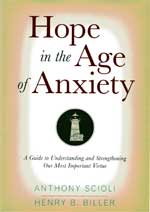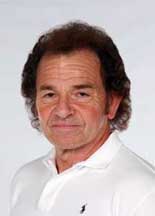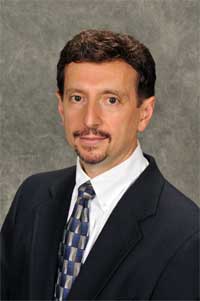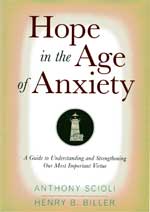 KINGSTON, R.I.–September 16, 2009—In these times of economic uncertainty, shrinking life savings, fears of global terrorism and technology-resistant germs, comes a book that offers hope.
KINGSTON, R.I.–September 16, 2009—In these times of economic uncertainty, shrinking life savings, fears of global terrorism and technology-resistant germs, comes a book that offers hope.
Not blind optimism, wishful thinking, or denial of reality, but a book that spans the “roots and wings” of true hope. Hope in the Age of Anxiety, just released by Oxford University Press, is co-authored by two clinical psychologists, Professors Henry Biller of the University of Rhode Island and Anthony Scioli of Keene State College (University System of New Hampshire). Their message is simple: Hope matters!
>So exactly what is hope? Poets suggest it is the “thing with feathers that perches in the soul”, a gift of the soul that “springs eternal.” President Barack Obama, author of The Audacity of Hope called it “the bedrock of the nation; the belief that our destiny will not be written for us, but by us.”

Biller, a Warwick resident, and Scioli, a former URI student (he earned his master’s and doctoral degrees from URI), call hope one of our most important virtues. “Hope is as essential to our well-being as the air we breathe,” says Scioli who is also a member of the graduate faculty at URI. “Abiding in hope is the basis for achieving true success, crafting loving relationships, and securing a genuine sense of peace.”
The authors find current theories on hope narrow at best. The pair drew on their own clinical experiences as well as the best insights of philosophers, theologians, poets and scientists from a variety of fields, to develop a fresh perspective on the topic.
Their book offers “hope lessons” and “hope tips.” • How do you build and sustain hope in trying times? • What should you look for in a good “hope provider? • How can hope help you to achieve genuine success? • How does hope help you to heal and fight illness? •How does hope relate to spirituality?
• What is your spiritual type and which faith sources are you most likely to find meaningful?
Grounded in science with practical tips, Hope in the Age of Anxiety focuses on four universal aspects of human experience that embody the essence of hope: attachment, mastery, survival, and spirituality.
Attachment: Hope is crafted from your interpersonal connections to individuals, groups, or institutions. Trust and openness are vital for hope.
Mastery. Hope is about foreseeable goal attainment, feelings of empowerment, and achieving a life of purpose.
Survival: Hope encompasses a variety of “survival skills”, including the capacity for healing and health maintenance as well as coping with trauma, loss, and other forms of adversity.
Spirituality: Each of the major religions of the world yields a particular brand of hope. Biller and Scioli cover the seven types of hope found in these religions and explore alternative forms of spirituality that can foster hope while also considering the hope prospects of atheists.
The four elements of hope often overlap, says Biller. “Hope is a dynamic and fluid process. Moreover, many self-help books, especially those published in America, are “one size fits all” and tend to focus solely on mastery.”
To help hope seekers discover their current hope profile, Biller and Scioli offer a hope “test”, a 40-question instrument on the book’s website, www.gainhope.com. If you are interested in a more detailed hope assessment, you can also take Part B (56 questions) designed to access your long-term capacity for hopefulness. For both tests, you will obtain a total score and then additional scores so you can gauge your strength and weakness, relative to others who have taken the test.
Scioli tosses readers a hope lifeline in this age of anxiety “Hopeful people are sustained by the belief that there are always options,” he says, adding that they are also more apt to stay calm in a crisis due to their broader perspective and faith in the future.

